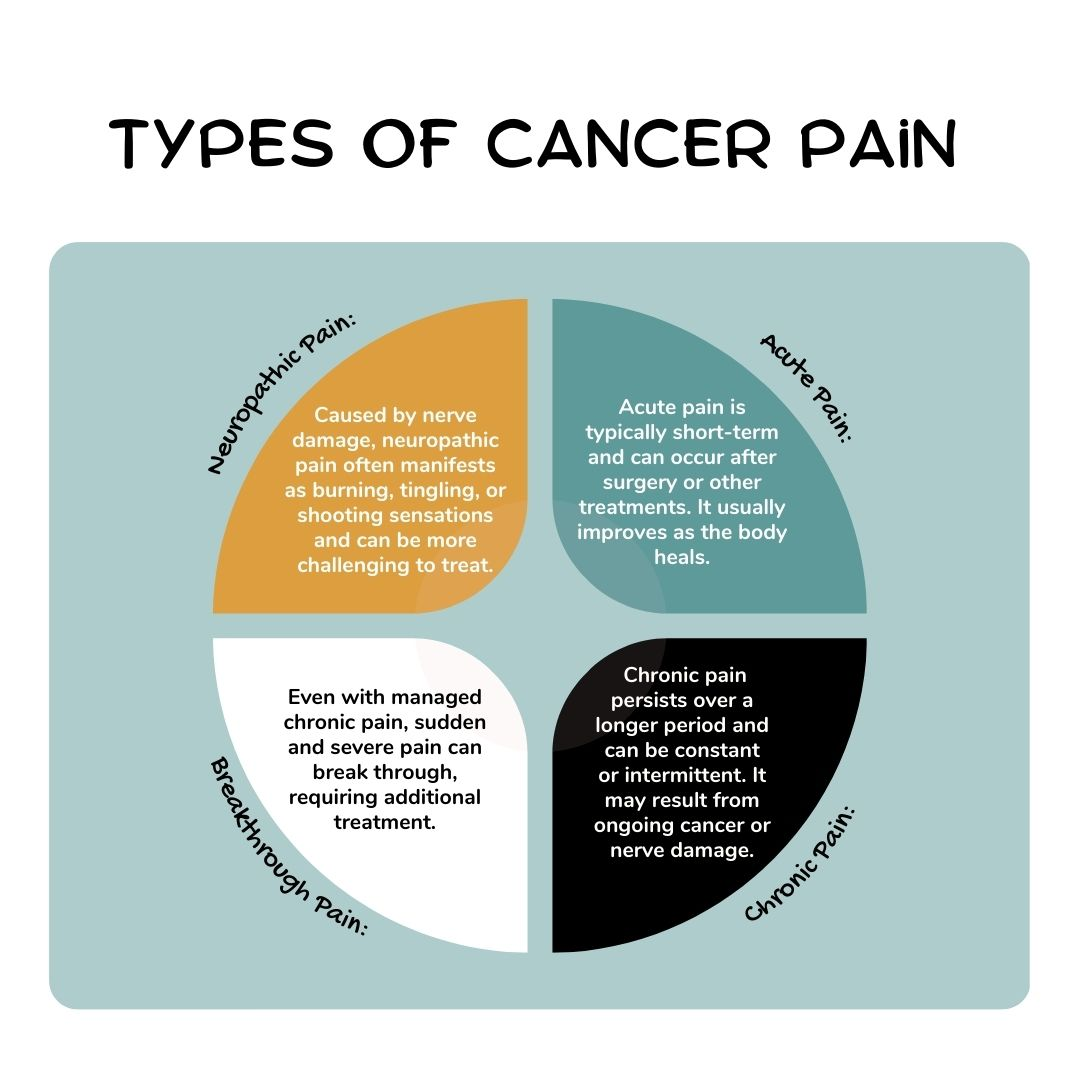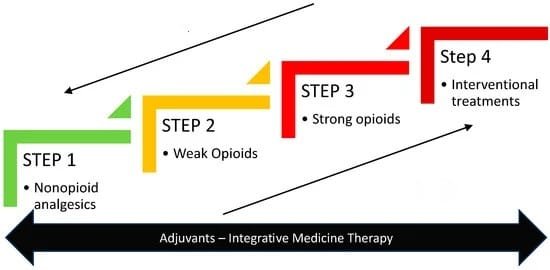Mitigate Pain Clinic – Dr Jeshnu Tople – Pain Management Specialist In Nagpur
Cancer Pain
Cancer Pain and Its Management

Understanding Cancer Pain
Types of Cancer Pain: Acute vs. Chronic
- Acute pain: This is short-term pain, often caused by injury or surgery. It may occur immediately after treatment or due to the tumor’s growth.
- Chronic pain: This type of pain persists over a long period and can be due to the cancer itself, nerve damage or the side effects of treatments like chemotherapy and radiation.

Common Causes of Cancer Pain
Cancer pain can result from several factors, including:
- Tumor growth: As tumors grow, they can press on bones, nerves, or organs, causing pain.
- Treatment-related pain: Surgery, radiation and chemotherapy can also lead to pain, either temporarily or permanently.
- Nerve damage: Chemotherapy-induced peripheral neuropathy is a common side effect, resulting in burning or tingling pain.
How Cancer Pain Affects Quality of Life
The Science Behind Cancer Pain
How Cancer Pain Develops
The development of cancer pain often stems from the interaction between cancer cells and surrounding tissues. Cancer cells can release chemicals that irritate nerves or they may cause mechanical pressure on nerves, leading to pain signals being transmitted to the brain..
The Role of Tumors in Causing Pain
As cancerous tumors grow, they invade surrounding tissues, pressing on nerves, bones and other structures, resulting in discomfort or pain. For example, bone metastasis, where cancer spreads to the bones, can cause excruciating pain due to the breakdown of bone tissue.
Nerve Damage and Cancer Pain
Nerve damage, either from the cancer itself or from treatments like surgery or chemotherapy, can lead to neuropathic pain. This type of pain is often described as burning, tingling or shooting pain that may be difficult to manage with standard pain medications.
Complexities of Treating Cancer Pain
Barriers to Effective Pain Control
Many patients face barriers in achieving effective pain control, including:
Fear of addiction to pain medications, especially opioids.
Concerns about side effects, such as drowsiness, constipation, or nausea.
Lack of access to specialized pain management services.
Traditional Pain Management Techniques
Opioid Therapy: Benefits and Drawbacks
Opioids are often prescribed for cancer pain, especially for moderate to severe cases. While effective, they come with potential risks, including dependence, tolerance, and side effects like constipation and drowsiness.
Non-Opioid Medications for Cancer Pain
In addition to opioids, non-opioid medications such as acetaminophen, NSAIDs, anticonvulsants or antidepressants can help manage mild to moderate cancer pain. These medications may be used in combination with opioids to enhance pain relief.
Radiation Therapy to Control Pain
Radiation therapy can be an effective way to control pain caused by cancer, especially when the tumor is pressing on bones or nerves. By shrinking the tumor, radiation can relieve pressure and reduce pain.
Surgery as a Pain Management Option
In some cases, surgery may be performed to remove a tumor that is causing pain. Surgery can provide significant relief, although it is not always a feasible option depending on the cancer stage or the patient’s overall health.
Interventional Pain Management Techniques
What is Interventional Pain Management?
Interventional pain management involves using minimally invasive procedures to target the source of pain directly. At Mitigate Pain Clinic, specialists use these advanced techniques to help cancer patients manage their pain effectively.
Role of Nerve Blocks in Cancer Pain Management
Nerve blocks are a common interventional technique used to prevent pain signals from reaching the brain. By injecting medications around specific nerves, nerve blocks can provide long-lasting relief.
Radiofrequency Ablation
Radiofrequency ablation (RFA) is a minimally invasive procedure that uses heat generated by radio waves to target and destroy nerve tissues responsible for transmitting pain signals. This technique is particularly effective for patients with cancer pain, providing long-lasting relief by disrupting pain pathways without significant side effects.
Alcohol Neurolysis
Alcohol neurolysis involves injecting an alcohol solution directly into or near nerve tissues to permanently damage the nerves transmitting pain signals. This technique is often used for severe cancer pain, especially in cases where other treatments have been ineffective, offering sustained relief by preventing the nerves from regenerating.
Spinal Cord Stimulation for Cancer Pain
Spinal cord stimulation (SCS) is another option for managing cancer pain, particularly for patients who do not respond well to medications. SCS uses electrical impulses to interrupt pain signals before they reach the brain, offering relief without the need for drugs.
Intrathecal Pump for Medication Delivery
For patients who require constant pain relief, an intrathecal pump may be recommended. This device delivers pain medication directly into the spinal fluid, allowing for lower doses of medication and fewer side effects compared to oral medications.

Importance of Personalized Pain Management
Tailoring Treatment Based on the Type of Pain
Each patient’s pain experience is unique, and so should be their treatment plan. Personalized pain management at Mitigate Pain Clinic involves assessing the type, location, and severity of pain to determine the most effective approach.
Multi-disciplinary Approach to Cancer Pain
A comprehensive approach to cancer pain management often involves a team of specialists, including pain management doctors, oncologists, nurses, and physical therapists. This multi-disciplinary team works together to address the various aspects of cancer pain.
Role of Psychosocial Support
Pain is not just a physical experience; it also has emotional and psychological dimensions. Psychosocial support, including counseling, support groups and mental health care, is crucial in helping patients cope with the stress and emotional toll of living with cancer pain.
Role of Physiotherapy and Rehabilitation
Physical therapy plays a crucial role in managing cancer pain by helping patients regain mobility, strength, and function. Exercise can reduce pain, improve flexibility, and enhance overall quality of life.
FAQs about Cancer Pain and Management
If medications aren't providing adequate relief, interventional techniques like nerve blocks or spinal cord stimulation may be options.
While it may not always be possible to eliminate cancer pain entirely, it can often be significantly reduced with the right combination of treatments.
Our Treatments
- Joint Pain
- Back Pain
- Sciatica Pain
- Neck Pain
- Hand Pain
- Shoulder Pain
- Foot & Ankle Pain
- Limb Pain
- CRPS Pain
- Cancer Pain
- Headache
- Hyperhidrosis
- Herpes Zoster Pain
- Chronic Pelvic Pain
- Scar Tenderness
- Postherpetic Neuralgia
- Trigeminal Neuralgia
- Peripheral Neuralgia
- Chronic Vascular Pain
- Generalised Body Pain
- Chronic Injury Pain
- Failed Back Surgery Syndrome
- Chronic Post Surgical Pain
- Other Painful Conditions
- Slipped DISC / PIVD